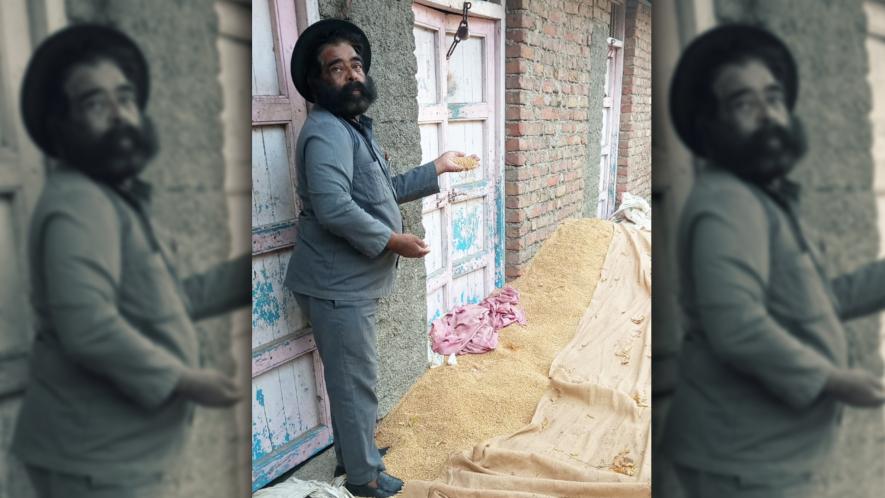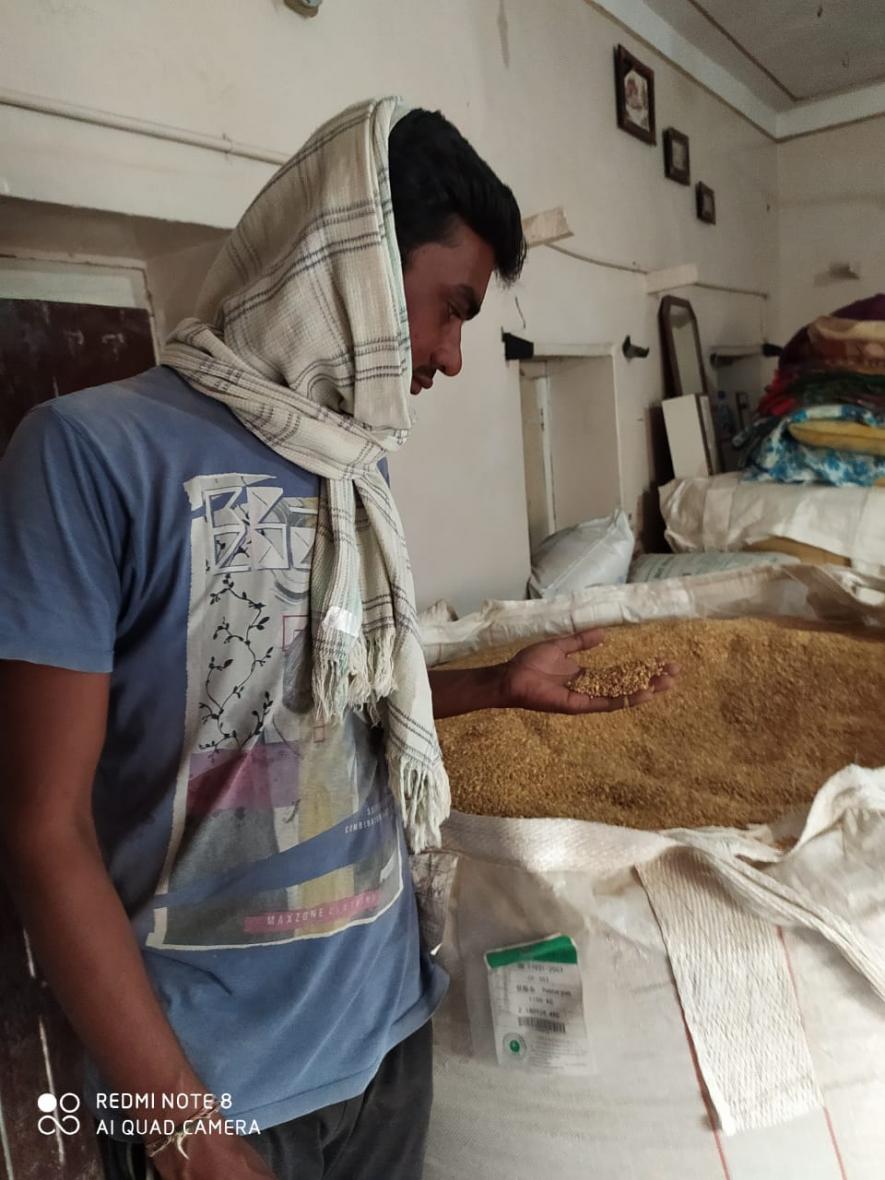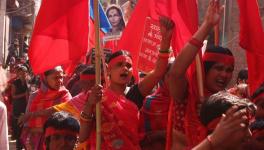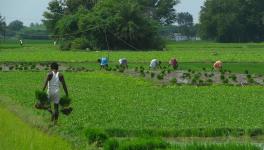Unsold Rabi, Unsown Kharif Crop – Farmers in Gujarat Dread a Looming Agrarian Crisis

Pratapsinh Dodiya is a farmer and director of the APMC Ranpur
Every single day since the lockdown due to the COVID-19 pandemic, Wijay Kantibhai Dabhi, 30, a farmer from Patana Bhal village of Valabhipur taluka, Bhavnagar district, has tried to sell crop harvested a month ago. But, all his attempts have been in vain, as the Agricultural Produce Market Committee (APMC) market is closed and there are too many farmers desperate to sell their harvest to a handful of private buyers.
“This year we had a good harvest and were looking forward to a decent income. But we have been unable to sell our crop so far with APMC being closed. Many from our village sell to private buyers from Surat, but only a handful of them have been functioning amid the lockdown. We are desperate to sell, but have no option but to wait”, Says Dabhi.
Further elaborating on the desperation of farmers, Dabhi told NewsClick: “I grew 400 mann (one mann is about 20 kilogram in Gujarat) of wheat, all of which is lying at my home. Some private buyers have assured us that they would all of it once the lockdown is lifted. But there has been no word from the APMC yet. Farmers are desperate and are now willing to sell at a lower than market price.” Citing the example of his kin, he said: “At an APMC market that opened for a day in Botad, my relative sold wheat for Rs 320 per mann instead of the APMC rate of Rs 450 per mann.”
Worried about preparations to be made for kharif sowing, Dabhi said: “I had taken a loan of Rs 3 lakh for this season (rabi) that I have to pay back. Also, payments have to be made for the tractor I rented. After I have paid for everything, I need money to make arrangement for next season (kharif season).”

Wijay Dabhi is a farmer from Patana Bhal village in Bhavnagar. He shows the crop stocked at his home
The APMC market In Ranpur taluka of Botad district was shut down and farmers were dispersed using police force. After the Gujarat government announced that all APMCs across the state will resume functioning from April 15, the farmers of Ranpur have begun loading crop on vehicles to carry these to the market.
Chief Minister Vijay Rupani had also announced that a five-member committee, headed by the district registrar, would ensure that the APMC functioned while maintaining social distancing. “Farmers will have to register with the committee first, who then will call specific number of farmers at a given day at the sale yard,” said Rupani.
However, the post bearers of Ranpur APMC are yet to receive any such information from the local authorities.
“We have not got any further information after the Chief Minister’s announcement to re-open the APMC. Some farmers have rented tractors and loaded their produce. If the market doesn’t open, the farmers will have to pay rent for each day they keep the tractor,” said Pratapsinh Dodiya, a farmer and one of the directors of the Ranpur APMC.
Explaining the farmers’ plight, Dodiya told NewsClick: “We farmers are worried primarily because we have loans to repay and prepare for the next season in time, or bear losses that we will not be able to recover. I had taken a loan of Rs 5 lakh and now cotton and wheat are lying at my home. If I don’t sell, how will I repay the loan?”
In Jamnagar, farmers have begun selling their produce to private buyers who have bought at a price lower than the APMC rate.
Mahindra Samridhi, a private agro company that offers multiple services like selling seeds, giving crop loans and buying produce, is one such company that has been approaching farmers of Kanachikari, Derachikari, Navagam and surrounding villages.
“Yesterday one Maheshbhai, an agent of Samridhi Mahindra company, came to our village and met farmers asking them to sell their produce. He offered Rs 310 per mann for the wheat I have, but I refused to sell. The private buyers are not even considering the quality of the crop. The APMC rate of wheat in Jamanagar ranges between Rs 385-400 as per quality. They (private buyers) are taking advantage of the plight of farmers since the closure of APMC,” Mehul Khetiya, a farmer from Kanachikari village, told NewsClick.
He said: “Before I had harvested my crop, I bought wheat from market for my own consumption for Rs 600 per mann, but farmers are not getting the price.”
Some farmers, however, have no option as their hands are tied because of company loans.
“A friend of mine had taken a loan from the company, so he had to sell his produce to him. They paid him Rs 900 per mann for coriander and deducted the amount of the loan. The market price of coriander ranges from Rs 1,000 -1300 as per quality,” said Khetiya, adding if the APMC stays closed longer, he may be pushed to sell to private buyers, too.
“We are small farmers and don’t have much space in our house to store our produce for long. I have kept wheat in the open and now I worry if it rains then my crop will be wasted. If things don’t change and APMC doesn’t open in next 10 days, I will also have to sell to private buyer,” he added.
In North Gujarat, farmers who primarily produce cotton have sold it for Rs 750 per mann instead of market rate of Rs 1,100 per mann.
“Farmers are in desperate need for money and have begun selling their produce for whatever meagre price they are getting. While big farmers are still sustaining, small farmers are desperate and arev among the worst hit by the crisis that has risen due to the closure of APMC markets,” Sagar Rabari, a Gujarat-based farmer rights activist told NewsClick.
Rabari said in Bhavnagar, farmers had sold onion sfor Rs 5-6 a kilogram, in Jamnagar, farmershave had to throw away watermelon. “In Valsad, chiku farmers are almost on the verge of throwing away their produce of a season. The mango farmers of South Gujarat, Kutch and Talaja in Junagadh are worried as unlike every season, their produce has not yet been booked by buyers from across Gujarat and North India,” Rabari said.
The closure of APMC markets does not bode well for the upcoming kharif sowing season, too, as not just loan repayment, the shortage of labour will also be a big challenge.
“The farmers are set to face an acute crisis for two seasons – for the rabi crop that has not been sold and kharif crop that is yet to be sown. By this time farmers sell their rabi produce and prepare for sowing kharif crop. They buy fertiliser, seeds and arrange for irrigation. They have already taken loans for rabi season that they will not be able to pay back. And if they have to survive the next season, they will have to take further loans. This agrarian crisis will create a vicious cycle for farmers that will take long time to recover.”
The likely exodus of stranded migrant labour, who are living amid extremely trying conditions, is another big problem facing Gujarat farmers.
“There will be a crisis of agrarian labourers even if the lockdown is lifted. After the hardship they have faced, the labourers will go back at the first chance they get, and won’t be returning soon,” added Rabari.
Get the latest reports & analysis with people's perspective on Protests, movements & deep analytical videos, discussions of the current affairs in your Telegram app. Subscribe to NewsClick's Telegram channel & get Real-Time updates on stories, as they get published on our website.
























